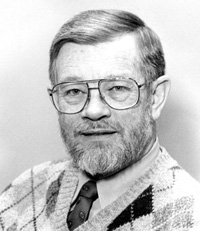 The following text was excerpted from a personal history written by Erik W. Austin, whose career at ICPSR lasted 41 years and included service as interim executive director. Austin says: “I have written these pages from my recall of events and developments described below. These recollections are my own, and do not reflect ‘official’ institutional history. Admittedly, some aspects of the consortium’s programs and activities will be slighted due to my tangential involvement in them. Contemporary survey data developments, the details of computational matters, and the Summer Program are three such areas that won’t get as much ink as they undoubtedly deserve.”
The following text was excerpted from a personal history written by Erik W. Austin, whose career at ICPSR lasted 41 years and included service as interim executive director. Austin says: “I have written these pages from my recall of events and developments described below. These recollections are my own, and do not reflect ‘official’ institutional history. Admittedly, some aspects of the consortium’s programs and activities will be slighted due to my tangential involvement in them. Contemporary survey data developments, the details of computational matters, and the Summer Program are three such areas that won’t get as much ink as they undoubtedly deserve.”
By 1970, some major organizational changes had occurred for the eight-year-old ICPR. Its parent organization was now the newly created Center for Political Studies rather than the Survey Research Center, and ICPR had a new Executive Director, political scientist Richard I. Hofferbert.i Internally, ICPR established three substantive sub-archives, each with a faculty Director and an assistant director. The Survey Data Archive was directed by University of Michigan political scientist Kent Jennings, with Carolyn Geda as Assistant Director. The Historical Archive was led by Jerome Clubb, and had Michael Traugott as Assistant Director. A third substantive sub-archive had been established to concentrate on data from the political science field of international relations. Funded largely by a contract from the US Office of Naval Research, the International Relations Data Archive had as its director U-M political scientist Raymond Tanter (succeeded by another U-M political scientist, Catherine Kelleher) while the Assistant Director was Robert Beattie. Traugott and Beattie were doctoral students in political science, as were many of the staff members of the three sub-archives. There was not a lot of coordination between the three groups, which had each developed somewhat different data processing procedures, and even maintained totally separate order fulfillment (“servicing”) staffs.

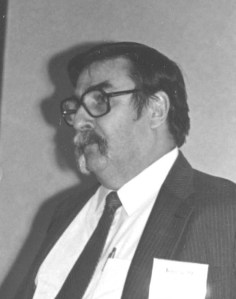 Jerry Clubb may not have seemed the most logical choice to replace Richard Hofferbert as Executive Director of ICPR in 1975. He was an historian, not a political scientist as his predecessors had been. Yet he had nearly 10 years of experience at ICPR, was a proven fundraiser, and had exhibited the leadership qualities that were required for such a position. The initial concept for filling the ICPR Executive Director position was a form of rotation among three people, Clubb and Associate Directors Kent Jennings and Catherine Kelleher, with Clubb “going first.” This leadership transition arrangement was concocted by Warren Miller; he had lengthy discussions with Clubb about this, and I assume he talked extensively with Jennings and Kelleher about it as well. I doubt that the ICPR Council was formally consulted, nor do I recall an official nominations process or a “nominating committee.” Little if any discussion was had of how long Clubb would serve as Executive Director. The professional plans of Jennings and Kelleher subsequently changed, and the “rotation” plan effectively became inoperative. Clubb continued on in the position, and thrived in it; he was to serve as Executive Director for 16 years, the last several of which were extremely stressful and contentious.
Jerry Clubb may not have seemed the most logical choice to replace Richard Hofferbert as Executive Director of ICPR in 1975. He was an historian, not a political scientist as his predecessors had been. Yet he had nearly 10 years of experience at ICPR, was a proven fundraiser, and had exhibited the leadership qualities that were required for such a position. The initial concept for filling the ICPR Executive Director position was a form of rotation among three people, Clubb and Associate Directors Kent Jennings and Catherine Kelleher, with Clubb “going first.” This leadership transition arrangement was concocted by Warren Miller; he had lengthy discussions with Clubb about this, and I assume he talked extensively with Jennings and Kelleher about it as well. I doubt that the ICPR Council was formally consulted, nor do I recall an official nominations process or a “nominating committee.” Little if any discussion was had of how long Clubb would serve as Executive Director. The professional plans of Jennings and Kelleher subsequently changed, and the “rotation” plan effectively became inoperative. Clubb continued on in the position, and thrived in it; he was to serve as Executive Director for 16 years, the last several of which were extremely stressful and contentious.
In the Historical Archive, most activity remained focused on large data-conversion projects. In collaboration with French historians Francois Furet and LeRoi Ladurie of the Fourth and Sixth Sections of the École Pratique des Hautes Études in Paris, ICPSR digitized French census, demographic, education, and industrial statistics, 1801-1926, from printed volumes of statistics published in France. Grants from the US National Science Foundation and the US National Endowment for the Humanities were obtained to support this work. Erik Austin, with a smattering of French language knowledge, was assigned to oversee this project. Grateful assistance was received from Raymond Grew of the University of Michigan’s History Department and Center for Western European Studies, which Grew directed. Other data conversion projects followed in rapid succession, including German election returns from 1919-1935; Macroeconomic Time Series for the US, Great Britain, France and Germany from 1650-1978 (originally prepared by the National Bureau of Economic Research in New York); and three sets of surveys that we called the “Cost of Living Surveys” conducted in the United States in 1888-1889, 1917-1919, and 1935-1937. The latter were the underpinning for what became the Bureau of Labor Statistics’ Consumer Price Index. Grants from the National Science Foundation supported the Macroeconomic Time Series project, while the National Endowment for the Humanities and the Sloan Foundation provided several grants to ICPSR for the Cost of Living Surveys.
The Cost of Living Survey project stretched into the 1980s, and involved an almost unprecedented transfer of official records from the US National Archive and Records Service in Washington, DC, to Ann Arbor. The original questionnaires for the 1917-1919 and the 1935-1937 surveys in this series were (and are) housed in the National Archives. Doing data entry at the Archives in those days was nearly impossible; Archives staff were quite resistant to the use of computers by “researchers” visiting their reading room. ICPSR was able to convince the Archives to temporarily transfer the survey questionnaires to the Gerald R. Ford Presidential Library in Ann Arbor (part of the National Archives system of presidential libraries) for purposes of data entry in Ann Arbor. This was no mean feat: the Archives staff was strongly opposed to the removal of records in their custody, having been indoctrinated with the philosophy that “once records are accessioned INTO the National Archives, THEY NEVER LEAVE!!” ICPSR shamelessly enlisted the good offices of two different Archivists of the US to consummate the heretical transfer arrangement. The first of these Archivists of the US was Robert M. Warner, who had been the longtime Director of the Bentley Historical Library at the University of Michigan (and which included the Michigan Historical Collections, former employer of Erik Austin). Warner convinced his staff at the Archives that they were not transferring records outside the National Archives system, but just moving them temporarily from one part of the system (in Washington, DC) to another (the Gerald Ford Library in Ann Arbor). When Warner stepped down as Archivist of the US, he was replaced by Don Wilson, who had been the Director of the Gerald Ford Library when records from the 1917-1919 survey had been temporarily transferred to his facility. For the 1935-1937 survey questionnaires, ICPSR reminded Wilson of the previous transfer arrangement, and Wilson agreed to a similar arrangement. Numerous staff from the National Archives deeply resented ICPSR for pulling off these two records-transfer arrangements and held grudges for quite a few years.
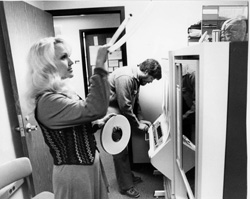
The late-1960s and early 1970s are recalled by many social scientists as the halcyon days of Federal funding support for social scientific research. Two of the United States’ most longevous social science data collection efforts were begun in this period: the Panel Study of Income Dynamics initiated in 1968 at ISR, and the General Social Survey conducted by the National Opinion Research Center (NORC) at the University of Chicago, starting in 1972. ISR also competed for and won a large ($3.2 million) Institutional Grant from the National Science Foundation in the early 1970s. A portion of this grant was earmarked for a second social science archive at ISR, dedicated to processing and preserving surveys that had been conducted at ISR’s several Centers. This archive, called the Social Science Archive (SSA), was overseen by Warren Miller, and had a small staff located in the main ISR building. (ICPR staff at the time were mostly located in the City Center Building, six blocks away from ISR.) SSA processed dozens of ISR surveys, coordinating to some extent with ICPR. When funding for SSA was not renewed, the datasets in the SSA holdings migrated to ICPR.
After stepping down as ISR Director in 1976, Angus Campbell was offered office space not by the Survey Research Center but by the Center for Political Studies. He was located in a neighboring “bay area” near ICPSR staff. Because of his fondness for sweets (and the provision by staff of cakes, cookies, and donuts to satisfy his sweet tooth), he dubbed his suite of offices “The Bay of Pigs.” This name was retained when ICPSR was later assigned that group of offices. Embellishing on the tradition, we obtained a small, pink battery-operated pig that was featured prominently in the “Bay of Pigs”; of course, we named the pig “Angus.” We have carried that pig to three different physical locations assigned to ICPSR since the 1980s; “Angus” now resides in the “bay” at Perry I occupied by NACDA.
The first effort to establish a special topic archive at ICPR also did not last long. Many social scientists outside the political science field of international relations were uncomfortable with the funding source for the International Relations Archive (i.e., the US Office of Naval Research, a branch of the Defense Department). In the mid-1970s, at the height of the domestic turmoil in the United States over the Vietnam War, strong pressure from the ICPR Council and other advisors to the Consortium led to the organization choosing not to seek renewal of the contract with the Office of Naval Research. This angered many in the International Relations (IR) research community, which was heavily dependent on funding from US intelligence agencies. Relations between ICPR/ICPSR and this group of scholars remained strained for many years after this episode. Thus the first instance of sustained Federal funding for a special topic data archive was abandoned by the mid-1970s. Within a few years, however, the concept was again revisited, with generally better results.
Considerable institutional diversification marked the early 1970s at ICPR. A number of smaller, teaching-oriented colleges and universities were brought into the membership, chiefly through establishment of a “federation” concept of membership. A large research university (the “hub” of a federation) would provide services and assistance to smaller institutions in their region, thus permitting ICPR to provide services to a set of smaller colleges and universities not heretofore served. The largest of these new “federations” covered the state university systems of California, New York, and Florida, with additional federations located in Illinois and among small liberal arts colleges in the Midwest.
1975 was a momentous year in the history of the organization. In that year, Richard Hofferbert stepped down as Executive Director and was replaced by Jerome M. Clubb. Clubb consolidated the three sub-archives, with Michael Traugott as Director of Archival Development and Janet Vavra as head of the Servicing Section of the whole organization. ICPR also changed its name by adding “Social” to reflect the growing interest of sociologists in the affairs of the enterprise. It thus became ICPSR. A momentous meeting of Official Representatives also occurred in 1975, with what had to be characterized as a “floor revolt” by “young Turks” against “the establishment.” The hot-button issue was contested elections for members of Council. Until that time, the Council election slate had been picked by a nominating committee under pretty careful control of the ICPR leadership, and consisted of exactly the same number of names as there were slots up for election. That changed following the 1975 OR meeting, as contested elections were mandated by the assembled Representatives (who were still mostly faculty members, and mostly from political science departments.)
 One of the unsung heroes of the ICPSR professional staff was Michael Traugott. Trained as a political scientist at Princeton and U-M, he was assigned in 1966 to the fledgling Historical Archive. He was the first Assistant Director of that archive and, with consolidation of the three archives in 1975, was the Director of Archival Development for the whole organization for a number of years. In addition to finishing his PhD, Mike raised millions of dollars in grants and contracts for ICPSR and led the efforts to establish the topical archives in the fields of aging and criminal justice. His fundraising acumen was little appreciated in the Center for Political Studies and ISR more generally, and time spent on these activities proved detrimental to his scholarly productivity. He ultimately obtained a faculty position at U-M in the Department of Communications Studies, where he has served as Chair for a number of years. ICPSR would have been a considerably different place without Mike’s efforts over the years.
One of the unsung heroes of the ICPSR professional staff was Michael Traugott. Trained as a political scientist at Princeton and U-M, he was assigned in 1966 to the fledgling Historical Archive. He was the first Assistant Director of that archive and, with consolidation of the three archives in 1975, was the Director of Archival Development for the whole organization for a number of years. In addition to finishing his PhD, Mike raised millions of dollars in grants and contracts for ICPSR and led the efforts to establish the topical archives in the fields of aging and criminal justice. His fundraising acumen was little appreciated in the Center for Political Studies and ISR more generally, and time spent on these activities proved detrimental to his scholarly productivity. He ultimately obtained a faculty position at U-M in the Department of Communications Studies, where he has served as Chair for a number of years. ICPSR would have been a considerably different place without Mike’s efforts over the years.
In the late-1970s, ICPSR established two new sub-archives, each focused on a particular type of data and supported by a recurring supply of external funds. The first of these was the Criminal Justice Archive and Information Network (CJAIN), funded by the US Department of Justice’s Law Enforcement Assistance Administration (LEAA), and initiated in 1977. Also in 1977, a second “special-topic” archive was created, the National Archive of Computerized Data on Aging (NACDA). The initial sponsor of NACDA was the US Administration on Aging, a branch of the then-Department of Health, Education, and Welfare. Each of these specialized archives concentrated on the collection, processing, and preservation of research data not hitherto collected to any great extent by ICPSR: crime and justice studies, and data relevant to the elderly and the aging process. The constituencies for each of these specialized archives were composed of both academic researchers and government officials and policymakers. The establishment of these “topical archives” provided ICPSR with clients from fields different from mainstream disciplines of political science, history, sociology, and economics. Yet an additional advantage of such topical archives was their sponsorship by federal agencies that carried with it the indirect cost associated with grants from such agencies. The indirect costs were an important source of revenue for CPS, with a small amount of it flowing to ICPR that permitted some expansion of Consortium activities and data collection arenas that would have been quite problematic had there been sole reliance on membership dues as an income source.ii Michael Traugott was the first director of each of these topical archives, writing a succession of grant proposals that brought annual sustained funding for these sub-archives throughout the 1970s and 1980s.iii
The relocation of most of ICPR to a site other than 426 Thompson Street (1968-1976) had enduring and damaging consequences for the organization in its relations with the rest of ISR. We were effectively cut off from all but cursory contact with not only the rest of ISR but also from our so-called parent organization, the Political Behavior Program of SRC. (In 1970, that Program became ISR’s fourth center, the Center for Political Studies, under the leadership of its first Director, Warren Miller.) One whole ICPR Executive Director’s term (that of Richard Hofferbert, 1970-1975) was served in the main ISR building while most of the organization’s employees were housed six blocks away, in rental space. We had to forgo the frequent interactions with other ISR scientists and staff that occur with propinquity, which made it difficult for either party to learn about the other and stay abreast of developments.
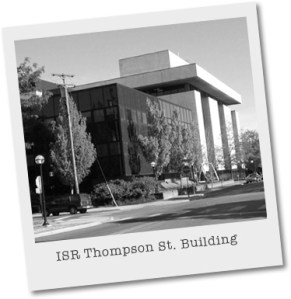 During the City Center Building period, the organization broadened its mission to include other social sciences beyond Political Science; changed its name to ICPSR to acknowledge our broader focus, particularly onto sociology; and nearly doubled the number of institutional members of the organization. These developments were barely, if at all, known by the rest of ISR or by most staff of the Center for Political Studies. An almost inevitable (but in retrospect, quite regrettable) “them-versus-us” mentality began to develop among those in City Center Building offices. It took more than a decade after ICPSR’s return to 426 Thompson Street in 1976 for that attitude to dissipate.
During the City Center Building period, the organization broadened its mission to include other social sciences beyond Political Science; changed its name to ICPSR to acknowledge our broader focus, particularly onto sociology; and nearly doubled the number of institutional members of the organization. These developments were barely, if at all, known by the rest of ISR or by most staff of the Center for Political Studies. An almost inevitable (but in retrospect, quite regrettable) “them-versus-us” mentality began to develop among those in City Center Building offices. It took more than a decade after ICPSR’s return to 426 Thompson Street in 1976 for that attitude to dissipate.
The majority of the Consortium staff moved back to the main ISR building at 426 Thompson Street in 1976, and were assigned space in the newly constructed Wing II of the complex. ICPSR staff occupied the entire fourth floor of that wing, with offices for the ICPSR administrative and Summer Training Program staffs in an adjacent “bay area” of the original wing of ISR. As the Consortium grew in the 1980s, it acquired more space in Wing I, acquiring “bays” mostly contiguous to the “Admin bay.” ICPSR would stay in space at 426 Thompson Street for 22 years.
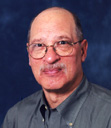 In 1971, Henry (Hank) Heitowit joined ICPSR to work in the Summer Training Program as a “library coordinator.” For the first 20 years of the Consortium’s existence, the Summer Program was led by a faculty member in Political Science. Donald Stokes was in charge of the Program until the late 1960s, and was succeeded by Gudmund Iversen (1968-1972). Lutz Erbring directed the Program from 1972-1977, followed by Robert Hoyer (1978-1981). Hank, during those years, held various titles, including “administrative coordinator,” “program coordinator,” and (after 1981) “coordinator” of the Program. In 1983, he was named Director of Educational Resources and remained in charge of the Program for almost 25 years. Under Hank’s leadership, the Program greatly expanded its offerings and grew in size from 300-400 participants annually to nearly 800 in 2006. His fervent advocacy of the Helen Newberry Residence (a University dormitory for women, rented each summer to serve as the headquarters of the Summer Program) seemed quixotic to many, with its small rooms and somewhat shabby look. The facility, though, has garnered the support of continuing faculty and most participants, and has become (like Hank) a symbol of the world-renowned ICPSR Summer Training Program in Quantitative Methods of Social Research. [Ed: Heitowit retired in 2007, although he has retained a consulting relationship with the Summer Training Program.]
In 1971, Henry (Hank) Heitowit joined ICPSR to work in the Summer Training Program as a “library coordinator.” For the first 20 years of the Consortium’s existence, the Summer Program was led by a faculty member in Political Science. Donald Stokes was in charge of the Program until the late 1960s, and was succeeded by Gudmund Iversen (1968-1972). Lutz Erbring directed the Program from 1972-1977, followed by Robert Hoyer (1978-1981). Hank, during those years, held various titles, including “administrative coordinator,” “program coordinator,” and (after 1981) “coordinator” of the Program. In 1983, he was named Director of Educational Resources and remained in charge of the Program for almost 25 years. Under Hank’s leadership, the Program greatly expanded its offerings and grew in size from 300-400 participants annually to nearly 800 in 2006. His fervent advocacy of the Helen Newberry Residence (a University dormitory for women, rented each summer to serve as the headquarters of the Summer Program) seemed quixotic to many, with its small rooms and somewhat shabby look. The facility, though, has garnered the support of continuing faculty and most participants, and has become (like Hank) a symbol of the world-renowned ICPSR Summer Training Program in Quantitative Methods of Social Research. [Ed: Heitowit retired in 2007, although he has retained a consulting relationship with the Summer Training Program.]
ICPR/ICPSR had, almost from the beginning of its existence, a set of faculty members appointed by the Executive Director as “Associate Directors” of the organization. These positions were intended to provide the organization with additional counsel and leadership, and add a complement of continuity to Council discussions and deliberations that was difficult to sustain in a body (i.e., the Council) that was completely replaced every four years. Until 1978, all the Associate Directors were University of Michigan faculty who also held ISR appointments: political scientists Philip Converse, Donald Stokes, Kent Jennings, Warren Miller (from the mid-1970s onward), and Catherine Kelleher, as well as social psychologist Angus Campbell. In 1978, a non-University of Michigan scientist was added to the roster of ICPSR Associate Directors, former Council chair Heinz Eulau from Stanford University’s Political Science Department. Appointment of a non-ISR Associate Director was auspicious, particularly for developments in the 1980s.
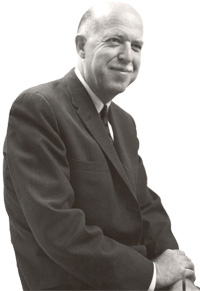
Throughout its history, ICPSR enjoyed a tremendous amount of support from “outsiders” — people at ISR, the rest of the University of Michigan, and above all from people outside U-M. All kinds of established scholars voluntarily served on the Council, on a myriad of advisory committees, and took time to make suggestions and read drafts of proposals. These individuals provided needed advice, assistance, and criticism, not to mention conferring a measure of legitimacy on the organization and its projects. There were far too many such individuals to list here, but some need special acknowledgment: Albert Hermalin (Population Studies Center) and Harold Johnson (School of Social Work) of the University of Michigan; Hubert “Tad” Blalock (Sociology, University of Washington); Allan Bogue (History, University of Wisconsin); Norval Glenn (Sociology, University of Texas); Heinz Eulau (Political Science, Stanford University); Cliff Clogg (Sociology, Penn State University); and Murray Murphy (History, University of Pennsylvania).
The 1977 Biennial Meeting of Official Representatives featured a tour de force banquet speech by Angus Campbell. Campbell had been one of ISR’s founders in 1946, had served as Director of ISR’s Survey Research Center from 1948-1970, and was ISR Director from 1970-1976. He was also appointed an Associate Director of ICPSR in the mid-1970s, and was a strong supporter of the Consortium. In his talk, he sketched the history of survey research in the United States from the 1930s to the 1970s. He encapsulated the social psychological approach to the study of political life with two concise but intellectually robust sentences: “A person thinks politically as he is socially. Social characteristics determine political preference.” Campbell tied survey research developments into the affairs of ICPSR and emphasized the importance of ICPSR to the social science enterprise. (One of the ICPSR staff’s great faux pas was not thinking to record Campbell’s talk. He died in 1980. The sole remaining trace of this magnificent talk are his notes for the speech, stored in his official papers at the Bentley Library.)
An important ancillary activity was begun in the mid-1970s, with heavy involvement (and financial commitment) by Warren Miller and Jerry Clubb. This was the establishment of the Social Science History Association (SSHA), which was chartered in 1974. Numerous historians (and not a few economists and sociologists who worked in historical depth) had become dissatisfied with the hostile attitude toward empirical work shown by the major professional association for historians, the American Historical Association. They banded together to form SSHA as an independent professional association, replete with a quarterly journal and annual conference at which research results would be reported. Warren offered space and financial support for the new association’s directorate, and Jerry became the first Executive Director. ICPSR staff (chiefly Jerry’s senior secretary, Donna Gotts, as well as Erik Austin) processed the membership transactions, and assisted with logistics for the annual meeting. Warren became the Association’s third president, and Jerry its eighth. ICPSR was to remain the strongest institutional supporter of the new association, even after Jerry stepped down as Executive Director in 1983.
i I believe Richard Hofferbert was personally selected by Warren Miller to succeed Miller as ICPR Executive Director. Hofferbert (recruited from Cornell University) also held an appointment as Assistant Professor in the U-M department of Political Science. He had served a term on the ICPR Council (1967-1969) before being appointed Executive Director. I didn’t know Hofferbert well at all. I doubt that I saw him more than 15-20 times during his five-year term as Executive Director. We had already moved our archive offices to the City Center Building when he arrived to take the Executive Director post, where his office was located in the main ISR building. He rarely visited the City Center Building, and many of us got to ISR only infrequently. Hofferbert was personable, and had a good sense of humor (bordering on the highly sarcastic). I’ll always associate him with a “name change” for me. From childhood, I had never liked the name “Erik” bestowed upon me by my mother. Rather, I preferred the nickname “Rick,” which was used by friends, teachers, and just about everybody I was associated with. This included my graduate student colleagues, University employers, and everyone I knew at ISR…until Hofferbert arrived. He preferred to be called “Rick” rather than Richard, and it became a bit confusing for people to refer to two “Ricks” within the same organization. I began to use my given name of “Erik” in the early ’70s to ease the confusion, and it stuck thereafter. Now, only family, close friends, and my grandchildren call me “Rick,” thus causing confusion of a slightly different sort.
ii Upon gaining its independence from CPS in 1998, ICPSR was able to retain all of its IDCR.
iii The name and sponsor of the criminal justice topical archive changed over time. The federal agency called LEAA was dissolved in the 1980s, and one of its government successors within the US Department of Justice was the Bureau of Justice Statistics (BJS). BJS took over sponsorship of ICPSR’s criminal justice archive, and asked that it be renamed the National Archive of Criminal Justice Data (NACJD) in the late-1980s. Two other Justice Department agencies joined as partners with BJS in the NACJD activity, beginning in the early 1990s. These were the National Institute of Justice and the Office of Juvenile Justice and Delinquency Prevention. Both of these agencies provided funding to ICPSR for the archiving of data whose collection they had sponsored. In the mid-1980s, sponsorship of NACDA was switched from the Administration on Aging to the National Institute on Aging, which proved to be a much better fit for NACDA and its mission.